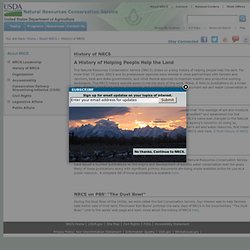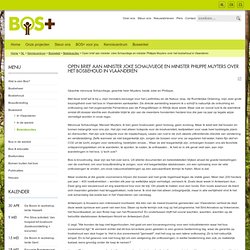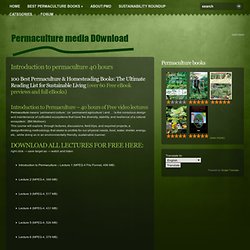

Behind the Brands. Nutrition Security Institute. Projects filtered by All.
Free Permaculture Design Course - Regenerative Leadership Institute. MijnTuin.org. Transnational Institute. NRCS - Natural Resources Conservation Service. History of NRCS The Natural Resources Conservation Service (NRCS) draws on a long history of helping people help the land.

For more than 75 years, NRCS and its predecessor agencies have worked in close partnerships with farmers and ranchers, local and state governments, and other federal agencies to maintain healthy and productive working landscapes. The NRCS history website seeks to tell the story of this work. Below, it links to publications on a broad array of topics, significant original documents, and galleries of photos that document soil and water conservation in the United States.
A Brief History of NRCS On April 27, 1935 Congress passed Public Law 74-46, in which it recognized that "the wastage of soil and moisture resources on farm, grazing, and forest lands . . . is a menace to the national welfare" and established the Soil Conservation Service (SCS) as a permanent agency in the USDA. NRCS History Publications The U.S.
NRCS on PBS' "The Dust Bowl" BOS+ Open brief aan minister Joke Schauvliege en minister Philippe Muyters over het bosbehoud in Vlaanderen. Geachte mevrouw Schauvliege, geachte heer Muyters, beste Joke en Philippe, Met deze brief wil ik bij u, mijn ministers bevoegd voor het Leefmilieu en de Natuur, resp. de Ruimtelijke Ordening, mijn zeer grote bezorgdheid over het bos in Vlaanderen aankaarten.

De directe aanleiding waarom ik u schrijf is natuurlijk de ontruiming en ontbossing van het zogenaamde Ferrarisbos aan de Fotografielaan in Wilrijk deze week. Maar ook en vooral luid ik de alarmklok omdat dit dossier slechts een illustratie blijkt te zijn van de meerdere honderden hectare bos die jaar na jaar op legale wijze vernietigd worden in onze regio. Katerva – Sustainability – Innovation. Introduction to permaculture 40 hours. This course will explore, through lectures, discussions, field trips, and required projects, a design/thinking methodology that seeks to profide for our physical needs, food, water, shelter, energy, etc., while doing so in an environmentally friendly, sustainable manner. right click → save target as → watch and listen part webinar with Bill Wilson of Midwest Permaculture - This is an 18 part 90 minute intro topermaculture webinar with Bill Wilson of Midwest Permaculture in Illinois.

Bill has been teaching permaculture for 6 years. He holds 2 PDC Certificates and has Advanced Training in Permaculture Designň and in teaching Permaculture. Documentary Films – Permaculture / Organic FarmingEbooks – Permaculture & Forest GardeningFree Documentary Films ArchiveFree Full Ebooks Archive You might also like: Earthbag Building: The Tools, Tricks and Techniques … Iceberg economies and shadow selves by Rebecca Solnit Underreported Struggles #43, October 2010 Energy Bulletin founder talks up Permablitz. The Power of Community. How Cuba Survived Peak Oil. Biodiversity Loss. Elizabeth Kolbertr discusses the Sixth Extinction ) The biodiversity crisis — i.e. the rapid loss of species and the rapid degradation of ecosystems — is probably a greater threat than global climate change to the stability and prosperous future of humankind on Earth. - professor Carsten Rahbek, Director for the Center for Macroecology, Evolution and Climate, University of Copenhagen. temperature zones are migrating towards the equator at 5 km/year- Dennis Meadows, author of Limits to Growth Biodiversity is humanity’s life-support system, delivering everything from food, to clean water and air, to recreation and tourism, to novel chemicals that drive our advanced civilization.

Yet there is an increasingly well-documented global trend in biodiversity loss, triggered by a host of human activities - Camilo Mora, University of Hawaii There are still tens of millions of unknown wild species out there. Soon, the majority of humanity will live in cities.
Permaculture.